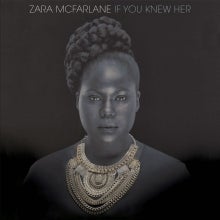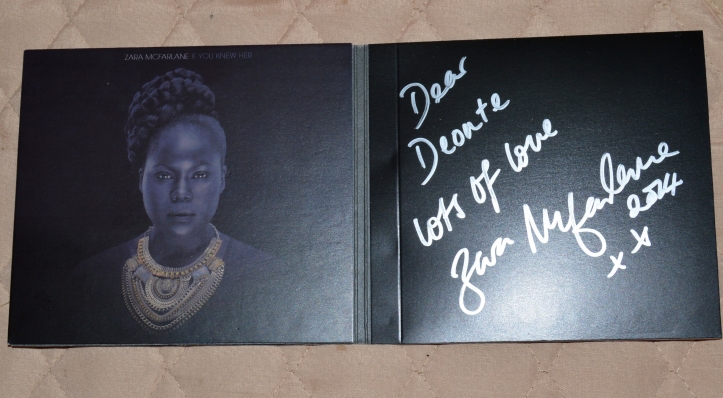Review | If You Knew Her by Zara McFarlane (2014)

“It’s never been easy being black, British and female in the music industry. . . But in recent years, it’s seemed that black females have been few and far between – and the ones who’ve popped up haven’t been able to stick around.”
The aforementioned quote was featured in the article, “Young Gifted, and Black – And Ignored” by Matilda Egere Cooper in 2011. As the article argues, there seems to be a huge void in the representation of black British female artists in the UK mainstream, and to this extent, Simon Frith (British sociomusicologist, music critic, and chair of the Mercury Prize) asserts that artists in this particular demographic are situated in Britain’s “blind spot.” Despite this uphill battle for adequate representation and recognition among black female artists in the UK, London-based singer and songwriter Zara McFarlane appears to be poised to breakthrough the music industry, especially following the release of two successful full-length albums in 2011 and 2014.
McFarlane’s musical style is one that is rooted in the tradition of jazz performance, which can be definitively heard in her vocal technique, compositional style, and use of mostly standard jazz instrumentation in the majority of her recordings (double bass, drums, piano, and sax). However, her style is also informed by her British experience as a woman of Jamaican descent, and the combination of her jazz educational training and influences from her social and cultural background has afforded McFarlane with a unique musical repertoire that gives her the flexibility to create music that expands across numerous genres.
In 2011, McFarlane released her debut full-length album, Until Tomorrow, on Giles Peterson’s Brownswood Recording label, which garnered significant attention from jazz critics and received stellar reviews and a nomination for a MOBO Award. In addition to showcasing McFarlane’s singing talent, the album also featured a number of original songs written by McFarlane such as “More Than Mine” and “Blossom Tree;” the result was a product largely hailed as a standout jazz album. Though Until Tomorrow was the revelation that jumpstarted McFarlane’s career, in many ways her latest album, If You Knew Her (2014), is truly her “coming out party.” Drawing from a wealth of musical sources, most of which she was exposed to during her upbringing in the UK, McFarlane’s songwriting on If You Knew Her takes the listener on a sonic journey through the domain of jazz as well as r&b, soul, and reggae to create a more daring, yet stunning album that greatly contrasts her first, and allows the artist to seamlessly crossover into the pop market.
Instead of conventionally using the same combination of instruments to unify the musical elements on the album, as she did on Until Tomorrow, McFarlane chose to make “tailor-made” arrangements for each song on If You Knew Her. As a result, every recording on the album has its own unique set of sound and aesthetic qualities as well as a specific narrative that gives the song its unique character. Moreover, while jazz serves as the musical foundation of If You Knew Her, it is evident from the very beginning of the album, with “Open Heart,” that the intent of the artist on her new album was to explore other stylistic/sonic possibilities, all while staying true to herself.
Accordingly, “Open Heart,” performed as a trio featuring McFarlane on vocals, Manu Delago on the hang,1 and Gavin Barras on double bass, is an obvious step towards the incorporation of other musical styles/sounds in her productions, as the track moves into the domain of soul music. The song begins with an 18-second hang solo that consists of a repetitive, eight-note descending musical figure in the key of A-minor that functions as an ostinato (and countermelody when the voice enters) and is overlaid with interlocking melodic ornamentations reminiscent of the sound and playing style of an mbira (“thumb piano”). Overall, the affect of the hang solo establishes a melancholy aesthetic tone for the piece. Following the introduction, McFarlane enters singing the narrative of a woman struggling to come to terms with the dismal reality of a broken love relationship. In rendering her somber melody, McFarlane leaps effortlessly into her upper register in a sweet, soft falsetto tone that gradually descends back into her natural vocal range by the end of each phrase, ultimately reflecting the melodic contour of the hang.
Excerpt: Zara McFarlane's "Open Heart"
Occasionally, McFarlane includes lovely background vocal harmonies to accentuate particular phrases, but these harmonic inclusions are only momentary for as soon as they come, either in the verse or chorus, they dissolve back into her solo voice in a bittersweet fashion. This characteristically “unsatisfying” musical effect seems to be a key binding element to the work because while it exacerbates the lack of an aural resolution in a musical sense, it also reflects the unresolved state of the woman and her love relationship in McFarlane’s narrative, intricately uniting the music with the text (Zara McFarlane, “Open Heart”).
Indeed, the theme of “love” and “romantic relationships” are a staple feature of If You Knew Her as McFarlane explores all of its joys and pains on recordings such as “You’ll Get Me In Trouble,” “Plain Gold Ring,” “The Games We Played” and “Love.” In addition to these recordings, If You Knew Her also includes two “jazzed up” reggae tunes, “Angie La La” (1969) by Nora Dean and “Police & Thieves” (1976) by Junior Murvin (Zara McFarlane, “Police and Thieves”).
McFarlane’s confidence at this stage in her career is on full display on the recording “Move” where the artist describes a woman overcoming insecurities by taking complete ownership of her life and becoming who she is destined to be. Musically, in contrast to the hauntingly somber tone of “Open Heart,” the album’s opening track described earlier, “Move” is upbeat and energetic to reflect the character’s aspirations of personal success. The song is performed by a quartet featuring McFarlane (vocals), Peter Edwards (piano), Max Luther (double bass), and Moses Boyd (drums), and begins with staggered entrances. The piano starts the piece, then dual voices enter coolly harmonizing the syllables “ooh” and “ah.” This is followed by a repeating bass drum pattern that establishes the rhythmic pulse for the tune, and a section of jazz vocal improv by McFarlane. Finally, the double bass enters midway during the first verse, cementing the groove as it interlocks with the rest of the rhythm section.
Excerpt: Zara McFarlane's "Move"
Stylistically, the music can be categorized as “neo-soul,” but as previously stated, McFarlane does not completely abandon her foundation in jazz/improvisation. Following the shifting harmonic sequences that comprises the bridge section (around 3:00), the quartet segues into a minute-long musical break at 3:40, featuring a modern jazz style piano solo accompanied by the double bass and drums, before returning back to the chorus where McFarlane boldly sings, “This is the time, this is the day / for me to find myself a brighter place / This is the time, this is the day / for me to MOVE” (Zara McFarlane, “Move”).
On her official website bio, McFarlane states that the songs on If You Knew Her are “more personal than anything I’ve ever written. It’s me opening up, taking listeners on a journey” with the songs “represent[ing] a journey through a woman’s life.” After also having had the privilege of hearing McFarlane perform live at the Blue Whale in Los Angeles, CA (accompanied by Kamasi Washington on sax, Gene Koye on drums, Lincoln Clearly on keys, and Ben Shepard on bass), I was not only able to bear witness to the very first concert of her debut U.S. tour, arguably an important transitional period in her music career, but also the fulfillment of her album as her musical journey is beginning to truly blossom. With more international attention set to come from her U.S. tour and this fantastic new album, McFarlane’s “brighter place” seems to be right around the corner.
The author's autographed copy of If You Knew Her.
1A hang is a percussive instrument invented by Felix Rohner and Sabina Schärer in Bern, Switzerland and is a modern instrumental development modeled after the Trinidadian steelpan.
Complete track-listing: “Open Heart,” “Her Eyes,” “Move,” “You’ll Get Me In Trouble,” “Police & Thieves,” “Spinning Wheel,” “Plain Gold Ring,” “Angie La La (feat. Leron Thomas),” “The Games We Played,” “Woman In The Olive Groves,” and “Love.”
For more information on Zara McFarlane, please visit her official website: http://www.zaramcfarlane.com
Deonte Harris is a doctoral student at UCLA in the Department of Ethnomusicology. His research engages music of the African diaspora with an emphasis on the Atlantic region (Afro-American, Afro-Caribbean, and black British).





